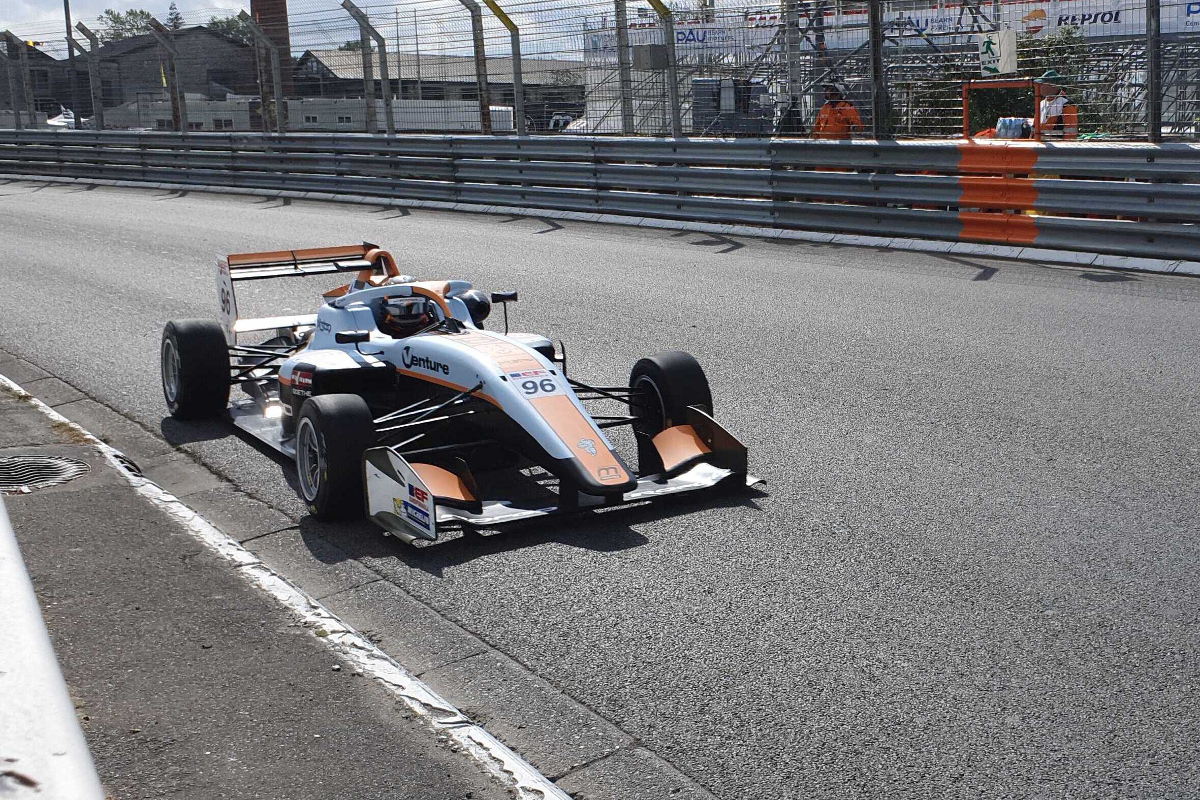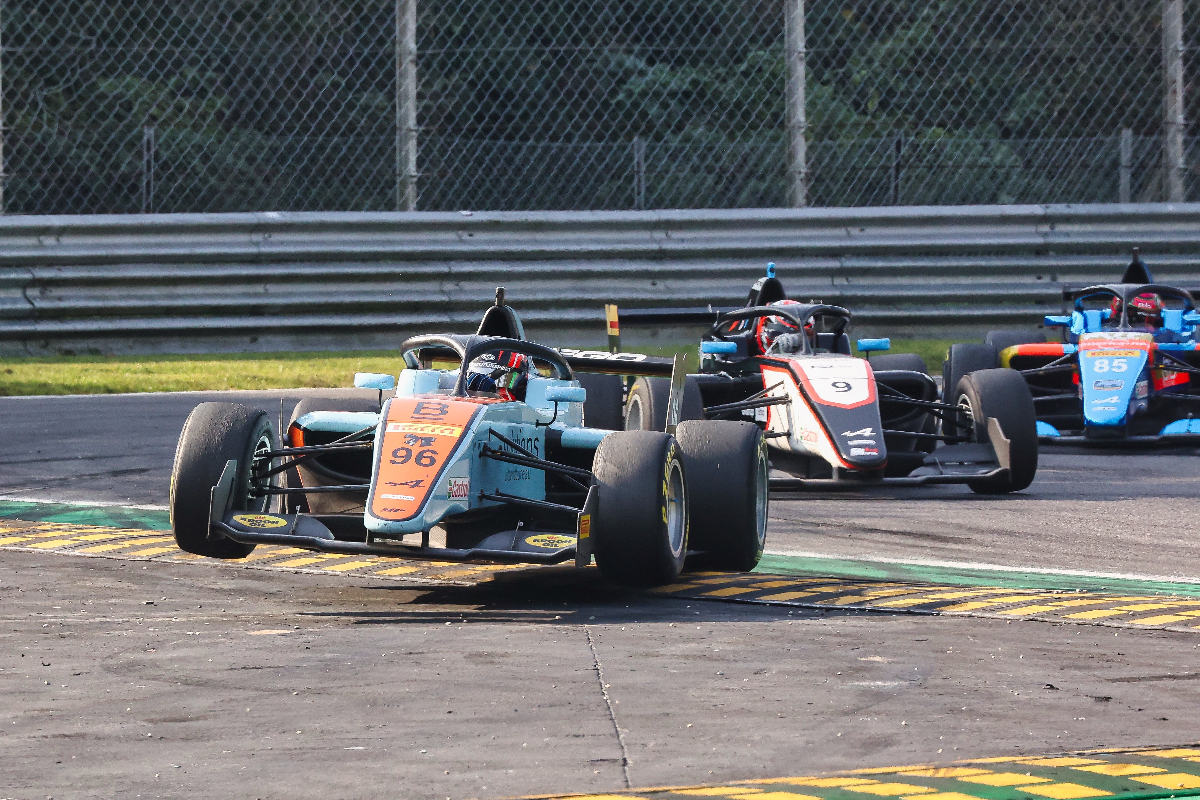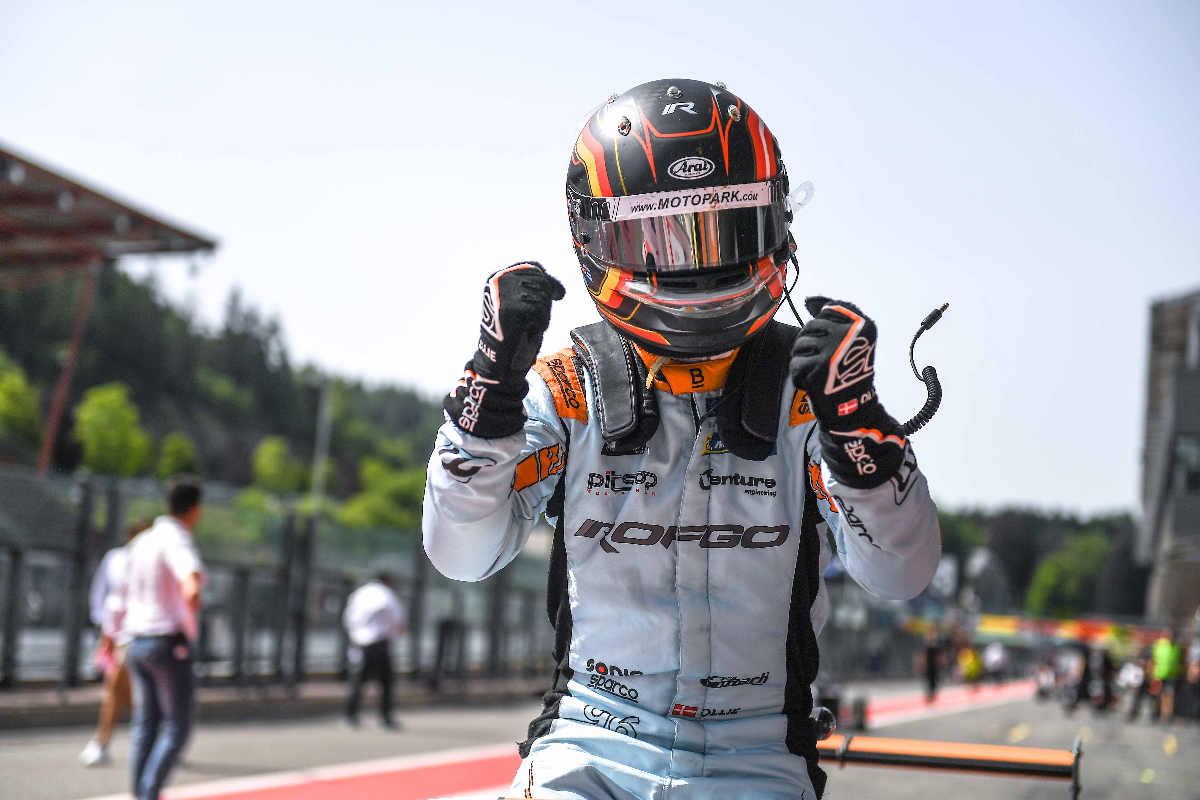
Photos: Fotospeedy
It’s easy to forget Oliver Goethe is only 17 years old, but then he didn’t have particularly memorable results in car racing prior to 2022. This year he’s dominating Euroformula and won the Dubai 24 Hours. How come?
Since 2019 there have been three key elements to title success in Euroformula, and this is taking the presumption that a driver has signed for Motopark – the series’ dominant team since its arrival three years ago.
The first is to understand, accept and maximise the set-up philosophy that the team uses. Some would call it ‘oversteery’, with more rotation of the rear axle at corner entry, but what it really does is provide a faster exit through most corners.
That can sometimes take a while for a driver to get their head around, but then Euroformula’s Michelin tyres help massively. The French manufacturer’s rubber provides a lot of driver feedback, consistent grip and although it does have it peak it is a tyre that once you find the window of performance you can keep it there for a long time.
Look at Marino Sato in 2019 for example on the above two points. Motopark’s driver coach Tom Dillmann spent a long time in FIA European Formula 3, which used a very similar car and engines to Euroformula, trying to bring Sato around to a set-up and a style of driving he couldn’t gel with on Hankook rubber. As soon as he switched to Michelins in Euroformula he clicked with ‘the Motopark way’, was a race-winner almost straight away and ended up cantering to a surprise title.
It was a similar story in 2020 as Yifei Ye bounced back from a difficult season in FIA F3, a rebranding of Formula 1 support series GP3, with its new car and Pirelli tyres. But once he landed in Euroformula he was rapid and also won the title. Ditto 2021 as Cameron Das claimed the crown after shelving FIA F3 for a focused Euroformula attack with Motopark.
And so we reach 2022, where again a driver is leading the way in breakthrough style by relishing a very strong Motopark package. Oliver Goethe has stepped up, rather than sideways, from Formula Regional and he was won seven out of 11 races. It’s a remarkable turnaround in form from a driver who had one ninth place finish in 33 races at the level just below and netted one win from 24 starts in Spanish Formula 4 before that. So what has propelled Goethe to team-mate crushing form now?
Goethe’s car racing career
| Series | Starts | Wins | Poles | Podiums |
|---|---|---|---|---|
| Spanish F4 | 24 | 1 | 4x 3rd | 6 |
| FRegional EU | 20 | 1x 9th | 1x 6th | 0 |
| 24H Series | 1 | (1) | (1x 3rd) | (1) |
| FRegional Asian | 13 | 1x 10th | 1x 9th | 0 |
| Euroformula | 11 | 7 | 4 | 10 |
“There’s not really any secret behind it, just working hard on and off track, training, looking at data, trying – no matter what the gap is – to improve as much as I can, because obviously the others will be closing in,” he says to Formula Scout.
“And then just hard work, head down, try not to make any mistakes. The race pace has been really good, qualifying still needs a bit of work, I think it’s a bit closer in quali. But the race pace is really good and I’m really happy with that.”
Goethe has been beaten in one out of five qualifying sessions, and across the four tracks visited so far his average single-lap pace has been 100.021% while chief title rival Christian Mansell is on 100.412%. Four of the five poles have been converted into wins, with the exception being the Pau Grand Prix when he was beaten off the line and then lost more places on lap one.
The starts have been more of a weakness than qualifying as there have been more points lost to those than from being pipped to Paul Ricard pole by Mansell, but Goethe thinks he is improving in that area and he won a reversed-grid race at Paul Ricard and two at Spa-Francorchamps after making up places on the opening lap.
“This year has been inconsistent, I would say, but it’s definitely improving to say the least. In race one here [at Spa] the start wasn’t amazing, but in the end I didn’t defend from Christian to get the tow up so in the end it played out quite well. And in race two I needed to have a good start, which I did, as I was starting P6.”
Several times this year he and Mansell have raced wheel-to-wheel, and at Spa there was lots of slipstreaming battles with both drivers letting each other past to then make use of the two, before eventually Goethe romped into the distance.
“You go through as many scenarios as you can with your engineer, with your driver coach, but anything can happen on track so you have to adapt to that, and there’s quite a lot of gameplay here with the tow,” Goethe says.
“People lifting maybe before turn one, trying to not defend so much to get the tow. In quali it was like that as well. You have to be smart, especially here with the slipstream it makes a massive difference.”
 Goethe has proven his racecraft as well as his pace this year, although he has been penalised for track limits abuse, and it’s clear when watching races that he is massively comfortable in the Dallara 320.
Goethe has proven his racecraft as well as his pace this year, although he has been penalised for track limits abuse, and it’s clear when watching races that he is massively comfortable in the Dallara 320.
“The first time hopping into the Euroformula car was just a crazy sensation. It’s such a quick car, especially coming from the FRegional, the driving style is very different and there’s a lot more downforce on the car, that suits me a lot better and I love it.
“FRegional Europe had a lot more drivers, obviously it’s a lot closer so every detail really makes a difference, but here so far it’s been going very well. I feel like I’ve improved and matured a lot as a driver.”
Key to Goethe’s adaptation to the car has been former Formula Ford 1600 and Renault Clio Cup UK racer Stephen Colbert, who is his race engineer, and ex-British F3 driver and FIA Endurance Trophy GTEAm winner Stuart Hall, his driver coach.
“He’s a good one,” Goethe says of Colbert. “He used to drive as well actually, in a way it’s very good as he understands what I’m feeling, also if Stuart is not here he’s a very good driver coach as well as a great engineer. It’s a great team.”
There is a 68-point margin between Goethe and Mansell at the top of the standings, and Goethe’s FREC experience has proven useful in getting the better of his rival who raced in British series before Euroformula. As at Spa though, the pair’s experience will be roughly equal for the final two rounds at Monza and Barcelona as Mansell did those rounds last year. Before then are trips to the Hungaroring, Imola and the Red Bull Ring.
“Hungaroring I’ve never been to, but it will be alot down to quali and race starts there as it’s a lot more difficult to overtake. Whereas Monza will be a bit more like here, no matter the quali result,” Goethe reckons.
“It’s a good track for overtaking. There’s a different variety of tracks. Barcelona for example with the tyre wear, that will definitely be a struggle, but we’ll do the best we can on each race weekend.”

Photo: Ida Wood
The title isn’t a done deal yet, but it’s difficult to see Goethe’s gap being overhauled when the grid has recently shrunk to 10 cars and finishing a race is almost a guarantee of points. Goethe’s not taking anything for granted though, particularly knowing it will get tougher again next year when he will likely move across to FIA F3. A step up to Formula 2 is unlikely.
“I think F2 will be very early still. I’m still young so there’s still some time.”
Hall has been working with Goethe since he was five years old, so has already spent 12 years coaching the Dane. For an even longer time he has been racing sportscars with Goethe’s father Roald, who has a large collection of Gulf-liveried cars and bought the 320 that his son used at the start of the year meaning he’s now on his second chassis of the season.
“I remember putting Ollie in a kart aged five, where we faked his age to get him in on, and to start with it’s about enjoying racing, isn’t it?” Hall recalls to Formula Scout. “And as you get better and as you go up and as you start taking it a bit more seriously, it then becomes a bit more intense.”
Goethe’s time in karting included coming second in IAME Series France’s X30 Junior series in 2018, but it was otherwise as anonymous as the first years of his single-seater career. So after years of midfield results in many places, what does Hall think has turned Goethe into a serial winner?
“I think it’s hard work. He’s a young lad. He’s 17-and-a-half years old. FREC was tough last year, there was a lot of promise but things didn’t go his way.
“He worked enormously hard over this winter: he worked on his fitness, on his mental approach. He’s at a team now that welcomed him with open arms, worked to his needs, and I think if a driver’s happy and comfortable in the environment they’re in, they’re going to get the best out of themselves and that’s what we’ve tried to create here. It’s a wonderful place for him to be. And so far he’s been going from strength to strength.

Photo: FRECA
“That’s not to say we’re going to have a few bumps in the road because that’s part of the learning process and we’ve had them before and we know we’re going to have them again. But right now, he’s driving beautifully, he’s driving very controlled and in a manner way beyond his years. Which is nice to see. But it’s not come all of a sudden, the kid’s put in an enormous amount of work behind the scenes and that’s why he’s where he is.”
Halls adds that Goethe is “driving with an awful lot of confidence” and that he may have had confidence in his own driving “knocked a bit” by his struggles in FREC with MP Motorsport.
“He’s always been a young lad that thrives on competition and the confidence, and when it wasn’t going his way it’s fair to say perhaps he let his head drop a little bit, which anyone would. I’ve been there myself many times. And it’s just about a question of working through that, bringing that confidence up.
“We spent some cold days at Spa [testing], that’s for sure, in the unpleasant conditions. but that’s where you lay your foundations for the season ahead. And then we spent two months in FRegional Asia, which it’s fair to say didn’t go very well. But we knew that we were not looking at FREC this year. That was about keeping him sharp, about laying more foundations for what’s to come.”
With his father, older brother Benji and his coach all racing sportscars, “with what he went through last year, it would have been very easy to switch the focus to a GT car” says Hall, but Goethe “kept the faith” that he could find results in single-seaters.
“Everyone gives Euroformula bit of a bad name at times because it hasn’t got the grid size that FREC’s got, but make no bones about it these kids at the front of this championship would be at the front in that as well. So there might not be the depth that FRECA’s got, but Ollie’s driving beautifully, it’s good to have some strong competition from Christian and from Vlad Lomko. So we know that if we don’t bring our A-game to a race, they’re going to beat us.
 “In sport, it’s a lot about confidence. You see it in F1, football, cricket. It’s more mental than it is physical, innit? You’ve got to believe in yourself, in the people around you, in the equipment you’re in, and that’s all to come together at the right time. For Ollie that is coming together nicely now.”
“In sport, it’s a lot about confidence. You see it in F1, football, cricket. It’s more mental than it is physical, innit? You’ve got to believe in yourself, in the people around you, in the equipment you’re in, and that’s all to come together at the right time. For Ollie that is coming together nicely now.”
Because of his long association with Goethe and his family, Hall considers him “more of a little mate” than a coaching client and “Ollie will come stay with me in the school holidays and stuff like that, we’ll train and we’ll prepare”. They “win together and lose together” and Hall says he “felt as much pain as Ollie did last year in FREC”.
That winning run started in this January’s Dubai 24 Hours, as Goethe made his debut in a contemporary sportscar alongside his father, Hall and Jordan Grogor in a Dragon Racing-run Mercedes and claimed victory in the GT4 class. He entered the event to learn Dubai Autodrome prior to racing there in the Formula Regional Asian Championship, as well as experience racing with his family, and he will likely make further endurance racing outings as one-offs but the focus remains on single-seaters.
In addition to having “more tools in his toolbox to take with him” from his Dubai 24H win, potentially the final component in Goethe’s success is the involvement of Bullet Sports Management. The firm is led by Jamie Campbell-Walter, who won the FIA Endurance Trophy with Hall, and contributed to the decision to move to Euroformula for 2022. Had it, together with Hall, Goethe and his father decided to have a second stab at FREC then it may have been another year of hard knocks.
More from Euroformula
How the Pau GP came back for 2022, and where it’s headed next
Euroformula to move to 17-inch tyres in 2023